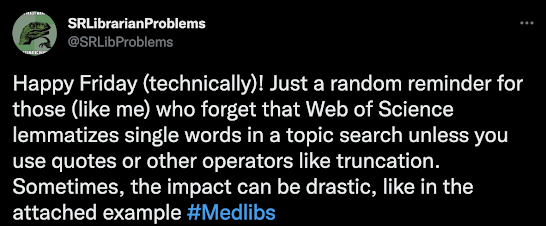Tip #14: Testing for Key Article Inclusion in Web of Science

In previous posts, we showed you how to test your searches for inclusion of key articles in PubMed and in Ovid databases . You can recycle your PMID strings to create test sets for other databases, too! I search Web of Science for virtually every SR or scoping review I do, so I usually recycle my list of PMIDs. Here's the syntax: PMID=(12450163 or 15982428 or 27391569 or 27940902 or 28941542 or 29056764 or 31651628 or 31874458 or 32340564 or 32855234) While this list contains 10 PMIDs, only 6 of them are indexed in Web of Science. I need to keep track of how many records the string retrieves in Web of Science the same way I would in MEDLINE. For non-MEDLINE articles, you can use DOIs with the following syntax: DO=(10.1182/blood-2020-143231 OR 10.1093/jac/dkaa016 OR 10.1016/j.jadohealth.2019.11.163 OR 10.1089/trgh.2018.0061 OR 10.1093/ofid/ofz360.2167 OR 10.1016/j.apmr.2019.10.050 OR 10.1177/0333102419859835 OR 10.1111/head.13549 OR 10.1212/CPJ.0000000000000401 OR 10.1080/01658107.

